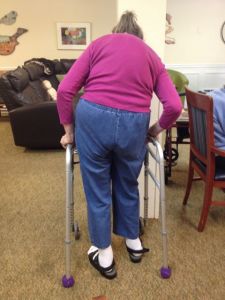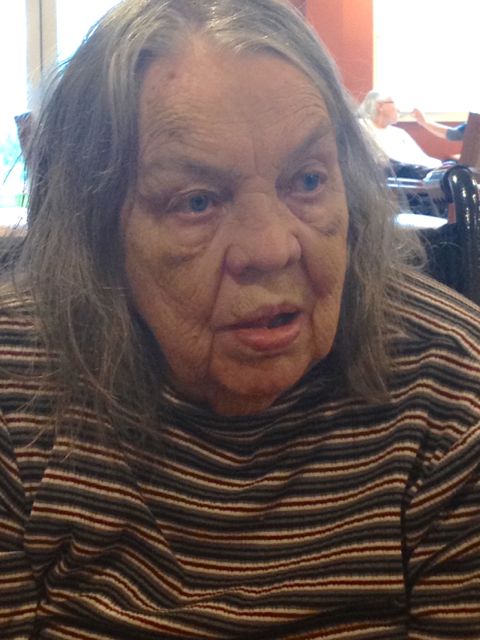
Irreversible Consequences of Drug Restraints in Memory Care?
Adult children just want their parent with dementia to be okay. Most do not have a clue on psychotropic (mind altering) medications or how they work. Families rely on professionals to recommend doses and medications for their senior parents. If a professional doctor or memory care community says that our mom or dad needs these medications, we tend to accept their wisdom. We are programed to not question authority. Yet when a parent is sedated in a drugged stupor over an extended period of time, more adult children are starting to ask why. At this point it can be too late for a senior with dementia.
Psychotropic medications can have a lasting affect on a senior with dementia.
Seniors may never be able to return to their baseline, before taking psychotropic drugs. My mother-in-law was given Haldol and now does the Haldol shuffle. It is a continuous stand up, walk, sit down and then it starts all over again. It is so sad to watch and they can’t stop. A professional told me it’s like their skin is crawling and they have to keep moving to make the feeling go away.
When we recently brought my mother-in-law her favorite Greek food for lunch, she sat down in front of her favorite foods at the table and then immediately stood back up and started the Haldol shuffle again. She had no desire to eat her favorite foods.
It has taken four months for the family to get her off the Haldol. My sister-in-law had to physically take my mother-in-law to her primary care physician and demand for the Haldol to be discontinued last week. The doctor was shocked my mother-in-law had been on Haldol for such a long period of time, with no recorded outbursts requiring such a strong medication.
So what happened?
My father-in-law, Bill, and mother-in-law, Amy, refused to move from their home of 56 years. Bill had been Amy’s caregiver for the last four years because she had dementia. When Bill had a sudden heart attack and went to the hospital, Amy was in jeopardy in the family home. The local children rallied around the dad in the hospital. For all intensive purposes, Amy was left alone for three days and three nights. My husband and I live 1000 miles away and we hired a geriatric care nurse. Amy was having delusions, not recognizing her own children, making unsafe choices, refusing to take her medications and eloped (she walked away and the police brought her home).
No community would accept her without medications
No assisted living would take her, because she had eloped. A memory care community came to assess whether they would accept Amy and said they would not take her unless she was medicated. The family understood drugs were a requirement at this point. My sister-in-law called Amy’s doctor’s office and explained Amy symptoms of delusions and etc., they did not want her in the clinic. Are you kidding me?!!? Amy’s doctor’s nurse said to take her to urgent care. But according to urgent care she was not bad enough to be admitted to the hospital. They sent her home with five pills of Adavan. Now what? Medications were required live in the memory care community. What could we do? She was not safe at home by herself and she didn’t want her adult children (she no longer recognized) to be with her. Finally a geriatric nurse provoked Amy to hit her. Then the police came and Amy was taken to the hospital by ambulance. There was no room in the psych ward so she was drug restrained in the emergency room for three days and two nights.
So the psychotropic nightmare began
The hospital said strong medication was necessary and started the Haldol. She was in the hospital for three weeks. Both memory care communities said the medications were necessary for Amy too. The family stupidly believed the professionals. Amy’s HMO had poor communication between the doctor, the hospital, the memory care communities and the home health professionals that saw Amy in person.
The first memory care community recommended making no drug changes for one or two months. When my husband and I flew to Seattle and saw Amy’s level of sedation, I said, “No way,” and fought to have the Haldol reduced by half. After the family figured out that the memory care community had no intention of supporting the reduction of medications, we moved Amy.
The second memory care community promised to reduce the psychotropic drugs and get her off the Haldol. Within two weeks they reduced the Haldol by half. Yet Amy was still in a drugged stupor. She was on a mix of AM and PM psychotropic drugs. This secure memory care community had a staffing ratio of one staff to ten residents.
We have since learned that drug restraints in memory care are common, particularly if they are short staffed.
I wrote this article to warn others adult children to demand reductions in psychotropic medications immediately. I am so sick of professionals saying to wait a month or more to see what happens with the medications. Then it’s too late. Amy went from fully toileting herself to incontinent. She went from eloping (walking away and the police brought her back) to barely walking. She went from smiling and talking to having a blank look on her face and staring into space.
We want to find Amy’s baseline again. She will never be at the same level of cognition from four months ago. There are moments and sentences were her personality returns. It is so sad to see her in this reduced state.
I am not saying that I am anti-drugs, but a Power of Attorney (POA) needs to be informed of the consequences of psychotropic medications. My own mother with dementia benefited from psychotropic drugs when she became very anxious and delusional in the later stages of her dementia. The price she paid for taking those psychotropic medications was permanently losing the ability to walk. I wish I had known then what I know now. Now my mother-in-law can barely walk…
Any hope? Have you had a similar experience with your parent? What happened? Have you witnessed drug restraints in memory care communities or hospitals? How can we stop it? How can a family find a good memory care that does not require drug restraints? What are the proper questions to ask?
Don’t wait until you’re in a health care crisis like author Diane Masson’s in-laws. It has been a nightmare for her in-laws and all the adult children. Research your future choices NOW to avoid being “put” somewhere, or having decisions made for you by others. “Your Senior Housing Options” is a new resource book available on Amazon.com with a 5-star rating. It offers a step-by-step guide to the options, including staying home.
Seniors, Boomer children, spouses, family members and caregivers are desperate to learn how to truly differentiate good senior housing from mediocre at best. Diane Masson’s new book will answer these heart-wrenching issues in an easy, simple, story telling format with humorous illustrations.
Diane has worked in senior housing for 17 years and is the regional marketing director for two debt-free Continuing Care Retirement Communities in Southern CA (Freedom Village in Lake Forest and The Village in Hemet). Her first book “Senior Housing Marketing – How to Increase Your Occupancy and Stay Full,” is being utilized by senior housing professionals across the country.
For weekly tips and advice go to www.Tips2Seniors.com and learn more from author and senior housing expert Diane Twohy Masson.

